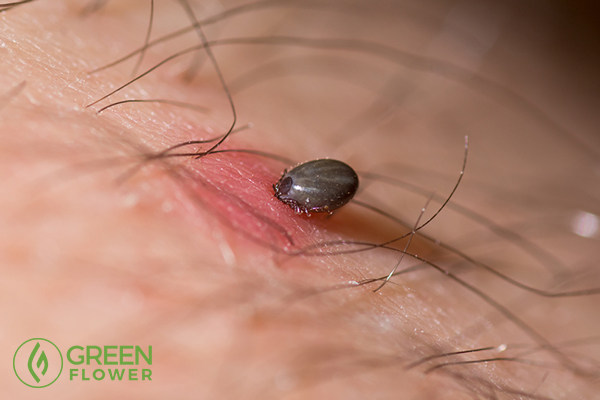
Medical cannabis care providers see it all.
From cancer patients to desperate parents, care providers take on the weighty responsibility of assisting whatever patients walk through the door.
A recent trend? Patients with Lyme disease are becoming more common in medical cannabis clinics.
Lyme disease is an old condition that is making a headlining comeback in the world of natural health and wellness—and with plenty of disagreement.
Alternative treatments, including cannabis therapies, for the infection remain controversial. Patients, however, are often desperate to find relief for long-lasting symptoms. As such, about medical cannabis for Lyme disease in clinics and dispensaries.
What is Lyme Disease?
Lyme disease, which affects 30,000 Americans each year, is a bacterial infection that occurs following a deer tick bite.
The bacterial culprit is the illustrious B. burgdorferi.
A bull’s eye rash is a defining characteristic of Lyme disease, creating a circle of reddened skin that radiates from the infection site.
Patients with an obvious bull’s eye rash should seek medical attention immediately. Without proper treatment, the infection can spread and potentially cause long-term symptoms and damage to the nervous system.
A series of flu-like symptoms often accompany the rash, appearing within a few days after infection.
Fatigue, extreme muscle ache, joint pain, and changes in mood are common in Lyme patients, and these symptoms can persist even after treatment.
The initial Lyme disease infection can cause severe symptoms on its own accord, but flu-like symptoms can persist into antibiotic treatment. Bacteria release toxins as they die, contributing to extended periods of illness.
Standard Treatment for Lyme Disease
The standard treatment for Lyme disease is a course of antibiotics that lasts between two and four weeks. For many people, this standard protocol is enough.
For others, however, symptoms may persist beyond the treatment period.
When symptoms of Lyme disease persist beyond the standard course of treatment, a patient may receive the diagnosis of chronic Lyme disease, persistent Lyme disease, or post-treatment Lyme disease syndrome.
Chronic Lyme disease is a topic of hot debate in scientific communities. A chronic case will experience symptoms of fatigue, muscle tension, pain, and general malaise for more than six months post-treatment.
Many radical new treatments are marketed to those with chronic Lyme, including oxygen and chelation therapies.
Despite the fact that established institutions like the U.S. Centers for Disease Control caution against extended and unconventional therapies, patients seeking relief from persistent illness are often desperate for treatment.
And yet, there is much ambiguity and confusion surrounding Lyme disease. Medical professionals and patients alike are left with serious questions about how to deal with recurring symptoms after a B. burgdorferi infection.
In many cases, it is unclear whether or not persistent symptoms are related to the initial onset of the disease.
Given this ambiguity and the lengthy duration of symptoms, it’s not surprising that Lyme patients are becoming increasingly more curious about medical cannabis.
Cannabis and Lyme Disease
To date, there have been no trials of cannabis medicines as treatments for Lyme disease, chronic or not. Medical cannabis patients using the herb to cope with symptoms of Lyme disease are engaging in an experiment.
Indeed, few medical professionals would recommend medicinal cannabis as a treatment for Lyme.
Even still, using cannabis to aid in Lyme disease recovery is not new. Records from medical cannabis clinics back in 1999 cited eight patients that used medical cannabis to manage the disease.
In total, however, the review included 2,480 patient records overall. These data suggest that Lyme sufferers constitute a tiny minority in the world of medical cannabis.
Since the 1990s, however, instances of Lyme have tripled in the United States, making encounters with Lyme patients more likely for care providers.
Cannabis for Lyme Symptom Management
As mentioned above, there have been no formal trials of cannabis to either treat or manage Lyme disease.
Symptom management, however, is perhaps the primary reason Lyme patients seek out medical cannabis.
Scientific research on the topic is sparse at best and non-existent at worst. The plant has, however, several general properties that may be attractive to Lyme patients.
Inflammation

Inflammation is a major contributor to the symptoms of Lyme disease.
Not only does the disease cause a substantial amount of pain, but the rampant inflammation caused by the infection can affect a multitude of bodily systems.
As such, controlling inflammation may be one way to ease symptoms of Lyme disease.
It is now established in preclinical research that cannabis anti-inflammatory potential.
Some evidence suggests that common anti-inflammatory drugs, like acetaminophen (Tylenol), work similarly to some cannabis compounds.
Additionally, compounds in the plant have also demonstrated success in reducing inflammation in animal models of infectious disease.
A 2011 study provides an example. Research published in the Journal of Neuroinflammation found that non-intoxicating cannabidiol (CBD) successfully reduced inflammation in rodents experiencing septic shock.
Sepsis is a life-threatening inflammatory reaction that can occur after a bacterial infection. Of course, sepsis and Lyme are to very different infections, and this research only preliminary.
Those interested in using cannabis effectively for inflammation control are strongly advised to work with a medical professional.
Fatigue

Like with any infection, fatigue and general malaise accompany Lyme disease. One major difference, however, is that symptoms can persist for months. Often, this fatigue is serious enough to interfere with daily living.
While cannabis oft-stereotyped as a sedative, some cultivars may be more stimulating than others.
The compound CBD, for example, is thought to have alerting qualities in low to moderate doses. In higher doses, however, CBD can have a sedating effect, especially amongst novice consumers.
Opting for cannabis products that are high in CBD and low in THC are more likely to mitigate fatigue.
Pain
Lyme disease is a serious infection.
When improperly treated, the disease can contribute to arthritis, shooting pains in the limbs, extreme muscle stiffness, and tension.
Not only is cannabis expected to be a potent anti-inflammatory, but compounds in the cannabis plant may boast pain-fighting effects.
Tetrahydrocannabinol (THC) is the primary psychoactive in the plant. When combined with CBD, the substances boast analgesic effects, temporarily relieving pain.
Although, each compound boasts analgesic effects in their own right.
The analgesic potential of cannabis is why the botanical is under consideration as an adjunct or alternative treatment to opioid painkillers. Further, human clinical trials of cannabis medicines have shown positive results for the treatment of cancer-related pain.
Muscle Relaxation
In addition to pain control, early evidence suggests that THC and other compounds in the plant may have muscle relaxant properties.
These properties may be attractive to cannabis patients seeking relief from excess muscle tension and stiffness.
Apart from THC, the fragrant terpene myrcene may hold potential as a muscle relaxant. Myrcene is an aroma molecule that gives some cannabis varieties a sedative effect and musky aroma.
Should the preclinical research hold its weight, the combination of these effects may make cannabis a useful tool for easing muscle stiffness and inflammatory pain.
Sleep Disturbance

Some types of cannabis are more likely to promote alertness. Others, however, may help patients catch up on some much-needed rest.
The pain, stiffness, and other symptoms of Lyme can make it difficult to stay asleep. Some patients may experience bouts of insomnia while others may find themselves frequently waking through the night due to their symptoms.
Cannabis is a natural sedative, used by many patients to improve their sleep. Sedation is more likely from THC-dominant products than CBD-dominant products.
As such, THC products are recommended for evening consumption. Although, morning grogginess is a possible side effect.
Nausea and Vomiting
Lyme disease is not always associated with nausea and vomiting, but these symptoms may affect some patients.
Cannabis has a long history as an antiemetic, and both THC and CBD offering anti-nausea effects.
Today, synthetic cannabis-like drugs are currently prescribed to cancer patients to quell nausea and vomiting associated with chemotherapy.
If nausea and vomiting begin to disrupt a patient’s life, medical cannabis may be able to help.
– This article was originally posted at Green Flower
About CannabisNewsWire
CannabisNewsWire (CNW) is an information service that provides (1) access to our news aggregation and syndication servers, (2) CannabisNewsBreaks that summarize corporate news and information, (3) enhanced press release services, (4) social media distribution and optimization services, and (5) a full array of corporate communication solutions. As a multifaceted financial news and content distribution company with an extensive team of contributing journalists and writers, CNW is uniquely positioned to best serve private and public companies that desire to reach a wide audience of investors, consumers, journalists and the general public. CNW has an ever-growing distribution network of more than 5,000 key syndication outlets across the country. By cutting through the overload of information in today’s market, CNW brings its clients unparalleled visibility, recognition and brand awareness. CNW is where news, content and information converge.
To receive instant SMS alerts, text CANNABIS to 21000 (U.S. Mobile Phones Only)
For more information please visit https://www.cannabisnewswire.com
Please see full terms of use and disclaimers on the CannabisNewsWire website applicable to all content provided by CNW, wherever published or re-published: http://CNW.fm/Disclaimer
Do you have a questions or are you interested in working with CNW? Ask our Editor
CannabisNewsWire (CNW)
Denver, Colorado
www.cannabisnewswire.com
303.498.7722 Office
Editor@CannabisNewsWire.com
This article contains Third-Party Content submitted by third parties, including articles submitted through the CNW Premium Partnership Program. All opinions, statements and representations expressed by such third parties are theirs alone and do not express or represent the views and opinions of CNW or its affiliates and owners. Content created by third parties is the sole responsibility of such third parties, and CNW does not endorse, guarantee or make representations concerning the accuracy and completeness of all third-party content. You acknowledge that by CNW providing you with this internet portal that makes accessible to you the ability to view third-party content through the CNW site, CNW does not undertake any obligation to you as a reader of such content or assume any liability relating to such third-party content. CNW expressly disclaims liability relating to such third-party content. CNW and its members, affiliates, successors, assigns, officers, directors, and partners assume no responsibility or liability that may arise from the third-party content, including, but not limited to, responsibility or liability for claims for defamation, libel, slander, infringement, invasion of privacy and publicity rights, fraud, or misrepresentation, or an private right of action under the federal securities laws of the United States or common law. Notwithstanding the foregoing, CNW reserves the right to remove third-party content at any time in its sole discretion.



















